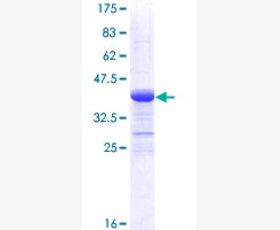Recombinant Rat T-lymphocyte Activation Antigen CD80/B7-1
| Product name: | Recombinant Rat T-lymphocyte Activation Antigen CD80/B7-1 |
| Source: | Human Cells |
| Purity: | Greater than 95% as determined by reducing SDS-PAGE. |
| Buffer Formulation: | Lyophilized from a 0.2 μm filtered solution of PBS, pH7.4. |
| Applications: | Applications:SDS-PAGE; WB; ELISA; IP. |
| Storage: | Avoid repeated freeze/thaw cycles. Store at 2-8 oC for one month. Aliquot and store at -80 oC for 12 months. |
| UOM: | 100ug/50ug/200ug/1mg/1g |
| Source | Human cells |
| Description | Recombinant Rat T-lymphocyte Activation Antigen CD81 is produced by our Mammalian expression system and the target gene encoding Vla30-Gln248 is expressed with a 6His tag at the C-terminus. |
| Names | T-lymphocyte activation antigen CD80; Activation B7-1 antigen; B7; CD80 |
| Accession # | O35187 |
| Formulation | Lyophilized from a 0.2 μm filtered solution of PBS, pH7.4. |
| Shipping |
The product is shipped at ambient temperature. |
| Reconstitution |
Always centrifuge tubes before opening. Do not mix by vortex or pipetting. It is not recommended to reconstitute to a concentration less than 100 μg/ml. Dissolve the lyophilized protein in ddH2O. Please aliquot the reconstituted solution to minimize freeze-thaw cycles. |
| Storage |
Lyophilized protein should be stored at < -20°C, though stable at room temperature for 3 weeks. Reconstituted protein solution can be stored at 4-7°C for 2-7 days. Aliquots of reconstituted samples are stable at < -20°C for 3 months. |
| Purity |
Greater than 95% as determined by reducing SDS-PAGE. |
| Endotoxin | Less than 0.1 ng/µg (1 IEU/µg) as determined by LAL test. |
| Amino Acid Sequence |
VGLFQISSGIVGQVSKSVREKALLSCDYKFCSEEQSIHRIYWQKHDKMVLSVISGVPEVWPEYKN RTVYDIANNYSFSLLGLILSDRGTYTCVVQRYEGESYVVKHLTTVELSVRADFPTPNITESGNPS ADIKRITCFASGGFPKPRLSWLENGRELNGINTTISQDPESELYTISSQLDFNTTYDHFIDCFIE YGDAHVSQNFTWVKPPEDPPDEKQHHHHHH
|
| Background | Cluster of Differentiation 80, also called B7-1, is a member of cell surface immunoglobulin superfamily which plays key, yet distinct roles in the activation of T cells. B7-1/CD80 and B7-2/CD86, together with their receptors CD28 and CTLA4, constitute one of the dominant co-stimulatory pathways that regulate T- and B- cell responses. CD80 is mostly expressed on the surface of antigen-presenting cells including activated B cells, macrophages and dendritic cells. Although both CTLA-4 and CD28 can bind to the same ligands, CTLA-4 binds to B7-1 and B7-2 with a 20-100 fold higher affinity than CD28 and is involved in the down-regulation of the immune response. |














